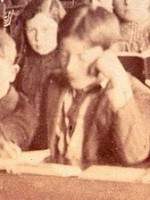Pluto

If you like this character, let us know!
Pluto, also called Pluto the Pup, is a cartoon character created in 1930 by Walt Disney Productions. He is a yellow orange-color, medium-sized, short-haired dog with black ears. Unlike most Disney characters, Pluto is not anthropomorphic beyond some characteristics such as facial expression, though he did speak for a short portion of his history. He is Mickey Mouse's pet. Officially a mixed-breed dog, he made his debut as a bloodhound in the Mickey Mouse cartoon The Chain Gang. Together with Mickey Mouse, Minnie Mouse, Donald Duck, Daisy Duck, and Goofy, Pluto is one of the "Sensational Six"—the biggest stars in the Disney universe. Though all six are non-human animals, Pluto alone is not dressed as a human.Pluto debuted in animated cartoons and appeared in 24 Mickey Mouse films before receiving his own series in 1937. All together Pluto appeared in 89 short films between 1930 and 1953. Several of these were nominated for an Academy Award, including The Pointer (1939), Squatter's Rights (1946), Pluto's Blue Note (1947), and Mickey and the Seal (1948). One of his films, Lend a Paw (1941), won the award in 1942. Because Pluto does not speak, his films generally rely on physical humor. This made Pluto a pioneering figure in character animation, which is expressing personality through animation rather than dialogue.
Like all of Pluto's co-stars, the dog has appeared extensively in comics over the years, first making an appearance in 1931. He returned to theatrical animation in 1990 with The Prince and the Pauper and has also appeared in several direct-to-video films. Pluto also appears in the television series Mickey Mouse Works (1999–2000), House of Mouse (2001–2003), and Mickey Mouse Clubhouse (2006–2013).
In 1998, Disney's copyright on Pluto, set to expire in several years, was extended by the passage of the Sonny Bono Copyright Term Extension Act. Disney, along with other studios, lobbied for passage of the act to preserve their copyrights on characters such as Pluto for 20 additional years.
Played by the actors
Filmography of Pluto (8 films)
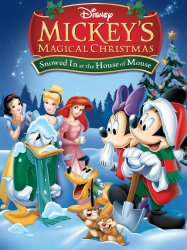 , 1h5
, 1h5Directed by Burny Mattinson, Roberts Gannaway
Origin USA
Genres Comedy, Animation
Themes Films about animals, Christmas films, Films about birds, Mise en scène d'un rongeur, Mise en scène d'une souris, Children's films, Mise en scène d'un mammifère
Actors Wayne Allwine, Tony Anselmo, Carlos Alazraqui, Bill Farmer, Jeff Bennett, Russi Taylor
Rating67%





A snowstorm leaves everyone in the House of Mouse stranded and "bah-humbug" Donald doesn't have any Christmas spirit. Mickey and all the other guests get hot chocolate and cookies to make Donald feel his Christmas spirit. The fun starts when Minnie gets the Christmas cartoons to watch. Their magical memories see to it that everyone has a holiday spirit, even Donald. At the end, everyone gets together and sings a musical number, "The Best Christmas of All".
 , 1h10
, 1h10Directed by Jean-François Laguionie, Jun Falkenstein, Toby Shelton
Origin USA
Genres Comedy, Animation
Themes Films about animals, Christmas films, Films about dogs, Films about birds, Mise en scène d'un rongeur, Mise en scène d'une souris, Children's films, Mise en scène d'un mammifère, Santa Claus in film
Actors Wayne Allwine, Kelsey Grammer, Tony Anselmo, Tress MacNeille, Russi Taylor, Milton Berle
Rating70%





Huey, Dewey and Louie wake up one Christmas morning and open their presents, even though they are supposed to wait first for Aunt Daisy, Uncle Scrooge and Aunt Gertie to arrive. After the boys take their new sleds from their Uncle Donald (not reading the included gift card) they go sledding and have Christmas dinner. While Donald, Daisy, Uncle Scrooge and Aunt Gertie sing carols, the boys play with their new toys. Later, it is time for the boys to go to bed and having enjoyed the day immensely, the boys then wish that it would be Christmas every day. Their wish is granted and at first the three are joyful. After a few days, however, they begin to get sick of Christmas and soon realize that every day will be exactly the same as the day when they first made their wish. They then decide to change the course of action of the next day by playing tricks and pranks, including swapping the cooked turkey with a live one for the dinner table. The day turns out to be a bad Christmas for everyone, especially Donald. After this, the boys finally read the gift card that was given to them which they had previously disregarded. The card is from Donald and Daisy, it wishes them love and explains that Christmas is not just about presents, it is about being with family. The boys instantly become guilty for their pranks and decide to make amends by making the next day the best Christmas ever. At the end of the next day, the boys finally realize the true meaning of Christmas and the time loop comes to an end, leading into the day after Christmas.
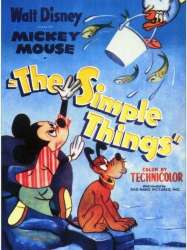
The Simple Things (1953)
, 7minutesDirected by Charles August Nichols
Origin USA
Genres Comedy, Animation
Themes Films about animals, Seafaring films, Transport films, Films about dogs, Mise en scène d'un rongeur, Mise en scène d'une souris, Children's films, Mise en scène d'un mammifère
Actors Pinto Colvig, Jimmy MacDonald
Rating62%





Mickey et Pluto vont à la plage. Pluto s'amuse dans les rochers et se retrouve aux prises avec une palourde qui se loge dans sa gueule.
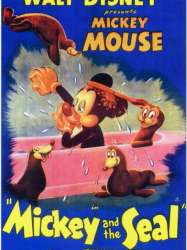
Mickey and the Seal (1948)
, 7minutesDirected by Charles August Nichols
Origin USA
Genres Comedy, Animation
Themes Films about animals, Films about dogs, Mise en scène d'un rongeur, Mise en scène d'une souris, Children's films, Mise en scène d'un mammifère
Actors Pinto Colvig, Jimmy MacDonald
Rating68%





Mickey visite un zoo et se fait un ami d'un petit phoque qu'il a nourri avec des poissons emporté dans son panier repas. Le phoque se cache dans le panier sans que Mickey s'en aperçoive. Une fois rentrée chez lui, Pluto le chien de Mickey découvre le phoque. L'animal marin se réfugie alors dans la baignoire de Mickey. Les deux animaux, le chien et le phoque, font de nombreuses bêtises avant que Mickey revienne et découvre le duo.
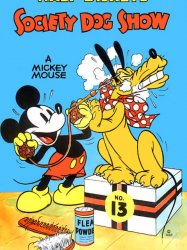
Society Dog Show (1939)
, 8minutesDirected by Bill Roberts
Origin USA
Genres Comedy, Animation
Themes Films about animals, Films about dogs, Mise en scène d'un rongeur, Mise en scène d'une souris, Children's films, Mise en scène d'un mammifère
Actors Walt Disney, Pinto Colvig
Rating67%





Mickey et Pluto assistent puis participent contre leur gré à une exposition canine. Pluto va porter secours à la chienne Fifi le pékinois.

On Ice (1935)
, 8minutesDirected by Ben Sharpsteen
Origin USA
Genres Comedy, Animation
Themes Films about animals, Sports films, Films about dogs, Films about birds, Mise en scène d'un rongeur, Mise en scène d'un canard, Mise en scène d'une souris, Children's films, Mise en scène d'un mammifère, Sports d'hiver, Patinage artistique
Actors Walt Disney, Pinto Colvig, Marcellite Garner, Clarence Nash
Rating71%





Mickey montre à Minnie ses compétences en patinage, tandis que Dingo pratique une pêche à travers la glace peu conventionnelle. De son côté, Donald a enfilé des patins à Pluto et les tentatives du chien pour patiner le font bien rire. Donald se retrouve accroché derrière un cerf-volant et se rapproche dangereusement d'une chute d'eau. Mickey part alors à son secours.
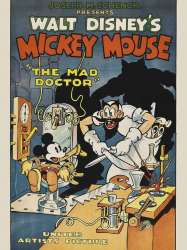
The Mad Doctor (1933)
, 7minutesDirected by Dave Hand
Origin USA
Genres Thriller, Comedy, Horror, Animation
Themes Films about animals, Films about dogs, Mise en scène d'un rongeur, Mise en scène d'une souris, Children's films, Mise en scène d'un mammifère
Actors Walt Disney, Billy Bletcher, Pinto Colvig
Rating75%





Par une nuit d'orage, un savant fou capture Pluto et l'emmène dans son château hanté. Dans le cadre d'une expérience chirurgicale, le détraqué souhaite greffer la tête du pauvre animal sur le corps d'une poule afin de vérifier si un chiot peut naître d'un œuf.
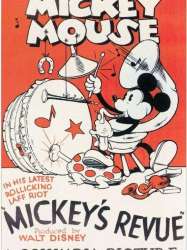
Mickey's Revue (1932)
, 7minutesDirected by Wilfred Jackson
Origin USA
Genres Comedy, Musical, Animation
Themes Films about animals, Films about dogs, Mise en scène d'un rongeur, Mise en scène d'une souris, Children's films, Mise en scène d'un mammifère
Actors Pinto Colvig, Walt Disney, Marcellite Garner
Rating63%





Mickey et ses amis donnent un spectacle.
 Connection
Connection
